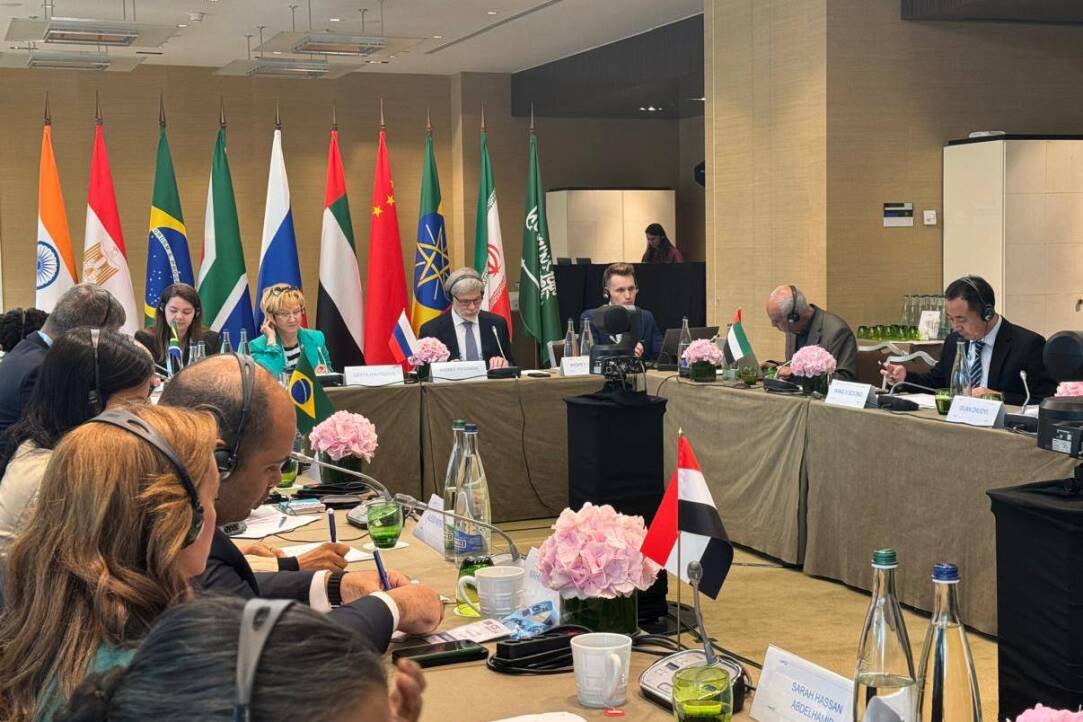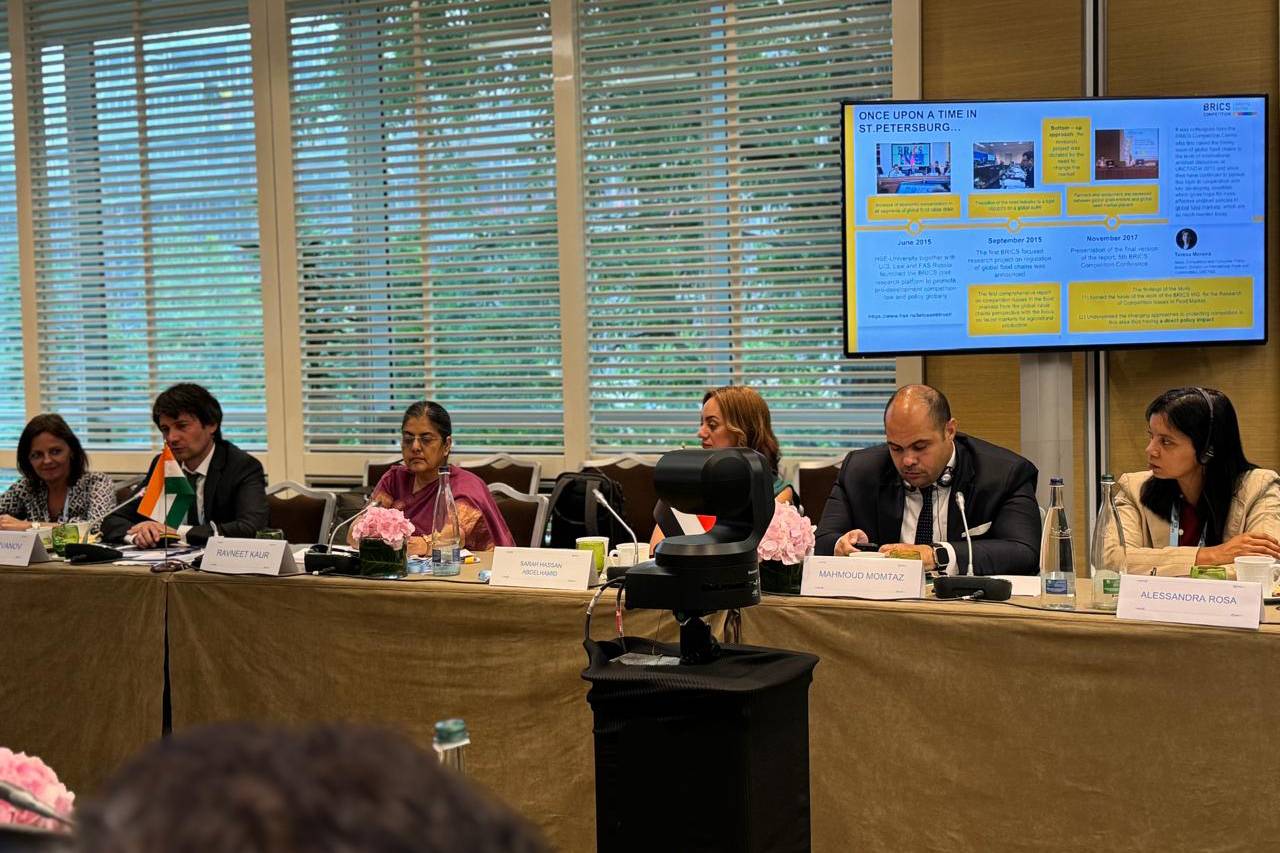BRICS Countries Support HSE University’s Project to Launch Fair Competition Platform

A meeting of the BRICS Coordination Committee on Antimonopoly Policy was held in Geneva as part of Russia's BRICS Chairship in 2024. The meeting participants supported a project to launch a BRICS Interstate Platform on Fair Competition, developed by the International BRICS Competition Law and Policy Centre of HSE University and presented by the FAS of Russia as an initiative of the Russian Chairship.
The event was attended by heads and representatives of antimonopoly authorities from BRICS member countries, both old and new, including Russia, China, Brazil, India, South Africa, Egypt, the United Arab Emirates, Ethiopia, and Iran. The meeting agenda included a discussion of significant results achieved by antimonopoly policies in BRICS countries, reviewing and strategizing further activities of the BRICS Working Groups focused on researching competition in socially important markets, and planning for future joint efforts.
There was also a discussion of the procedure for the new BRICS members' competition authorities to join the Memorandum of Understanding on cooperation in the field of competition law and policy of the BRICS countries, signed in St. Petersburg in 2016.
The meeting concluded with the participants adopting a Joint Statement by the Heads of the BRICS Competition Authorities, highlighting the need to consolidate efforts to maintain healthy competition in socially significant markets.
The proposed BRICS Fair Competition Platform envisions proactive convergence of antitrust policies among BRICS countries through mechanisms for reviewing transactions leading to economic concentration, as well as joint investigations and research within the BRICS space. This new format of cooperation will make it possible to identify problem areas related to monopolisation and cartelisation, as well as other areas in the global economy that require special antitrust attention.
The attending BRICS antimonopoly agencies supported the initiative from the FAS of Russia and the BRICS Centre and proposed that work should start to further develop the specific mechanisms for its implementation so that the project may be presented for approval at the next, 9th International Conference on Competition under the auspices of BRICS in Cape Town in 2025. The platform will enable antitrust regulators in BRICS countries to influence more actively the global architecture of economic relations.
According to Alexey Ivanov, Director of the International BRICS Competition Law and Policy Centre, the agreement on the draft platform is a significant step toward full institutionalisation of cooperation on the BRICS antitrust track and a notable success of the Russian Chairship.

Alexey Ivanov
Director of the International BRICS Competition Law and Policy Centre
'The challenges of the global economy and the growing complexity of business organisation require more advanced formats of cooperation. This necessity has been recognised by UNCTAD and other international expert bodies and supported by empirical data from a survey of BRICS antimonopoly agencies, conducted by the International BRICS Competition Law and Policy Centre of HSE University in 2023.'
The survey focused on the challenges of collaboration in addressing global mergers and acquisitions and on the opportunities for deeper cooperation among BRICS regulators in this area. The survey results reveal a clear demand for closer engagement in supervising global transactions that can lead to economic concentration. The proposed launch of an antimonopoly platform is a logical continuation of the research conducted by the HSE International BRICS Competition Law and Policy Centre.
Of particular interest to regulators, as the first possible step and one of the key elements of the future platform, is the launch of a coordinated system for monitoring mergers and acquisitions—the so-called 'merger radar.' This system will allow monitoring transactions within the BRICS region and prevent companies from withholding information from regulators.
Alexey Ivanov explained that the proposed initiative is not just a mechanism for cooperation but an instrument for harmonising the countries' positions on how they can jointly influence the global economy, global markets, and global value chains.
'The platform will help develop and put into practice effective approaches to influencing global markets. The BRICS countries have supported the idea of creating a grain exchange, an initiative that also represents a step toward greater integration among BRICS countries. A platform to support honest and fair competition will be an effective way to facilitate agreements in other sectors,' he said.

According to Andrey Tsyganov, Deputy Head of the FAS of Russia, the objective at this stage is to work out specific technical details of the project implementation, and the HSE BRICS Centre is about to embark on this task. 'Indeed, the need for such a mechanism of in-depth cooperation is long overdue. Cooperation in the field of antitrust policies within BRICS, founded on the Memorandum of Understanding on Cooperation in Competition Law and Policy among BRICS countries in 2016, is renowned for its successful performance. Today, regular communication has been established among the BRICS antimonopoly agencies, supported by a broad expert community from participating countries and effectively coordinated by the HSE International BRICS Competition Law and Policy Centre. It is necessary to build up the Centre's capacity and use its intellectual resources for launching the fair competition platform,' Andrey Tsyganov believes.
As noted by Mahmoud Momtaz, President of the Egyptian Competition Authority, 'We highly appreciate the work of the BRICS Centre; interaction within the BRICS antimonopoly community would be impossible to imagine without it. As the competition authority of a new BRICS member, we have felt tremendous support from the centre since the beginning. Earlier this year, in February, we co-hosted a joint event—a meeting of the BRICS Working Group on Food Markets.'
He believes that the ongoing large-scale sectoral study of food markets in the BRICS countries, particularly focusing on grain trade and supported by experts from the BRICS Centre, holds particular significance for Egypt. He noted that Egypt and the broader Middle East region are 'especially vulnerable due to increased concentration in certain sectors of the global food chain.'
See also:
‘Geographical Distance No Longer a Problem’: ISSEK Fosters Cooperation with Think Tanks in BRICS Countries
In September, the HSE Institute for Statistical Studies and Economics of Knowledge hosted an international working meeting with representatives from Brazilian, Egyptian, and Indian think tanks. The participants discussed opportunities for cooperation, including joint surveys, comparative studies, databases, and publications on foresight, technology, and innovation. It was also decided to draft a multilateral agreement to establish the BRICS Foresight Association.
HSE Experts Take Part in the First International Workshop on Technological Sustainability of BRICS
On September 19–20, Skoltech hosted the First International Workshop on Technological Sustainability of BRICS: University-Industry Partnerships, organised jointly with HSE University Human Capital Multidisciplinary Research Center. The meeting was held as part of the BRICS working group on technology foresight and science and technology studies.
HSE Researchers to Develop BRICS Exchange System Together with Chinese Experts
HSE University International BRICS Competition Law and Policy Centre and the Competition Policy and Assessment Centre founded by the State Administration for Market Regulation of China signed a cooperation agreement. The parties agreed to come up with proposals for the development of exchange trade in goods and raw materials between Russia, China, and the BRICS countries.
‘What Makes BRICS Effective Is Its Diversity’: HSE University Representatives Begin Work at EEF
HSE University Vice Rector Victoria Panova spoke at the Eastern Economic Forum (EEF 2024) that began in Vladivostok. The topic of her speech was the expansion of BRICS.
'Staying Open to New Challenges and Opportunities Is Crucial'
The Tenth BRICS Youth Summit was held in Ulyanovsk from July 22 to 26. The event was attended by more than 200 early-career professionals from Brazil, India, China, Egypt, Iran, the United Arab Emirates, Saudi Arabia, Ethiopia, South Africa, and Russian regions. Participants gathered to discuss current global issues and explore opportunities for youth collaboration. Students of HSE University who attended the Youth Summit shared their impressions with HSE University Life.
HSE University Launches Consortium of BRICS Law Schools
The HSE Faculty of Law hosted an online meeting with law schools and expert centres from BRICS countries. The purpose of the event was to join efforts to advance legal science and practice for the benefit of the organization. To this end, at the initiative of the Dean of the Faculty of Law Vadim Vinogradov, a Consortium of BRICS Law Schools was established, comprising representatives of leading higher education institutions from a number of countries.
‘At HSE University I Had the Opportunity to Meet the Best Academics’
In April 2024, HSE School of International Regional Studies of the Faculty of World Economy and International Affairs organised a round table ‘Russia and the Most Influential Countries of the Global South: Comparing Approaches to the New International Political and Economic-Financial Order’. Seyedmohammad Seyedi Asl, Research Fellow at the School of International Regional Studies, spoke to HSE News Service on his report ‘Global South, BRICS, and Iran's Foreign Policy’ presented at the round table, his research interests and impressions of working at HSE University, and living in Moscow.
‘We Work to Create a More Prosperous, Fair, and Safe World’
On July 3–4, 2024, the IX BRICS Civil Forum was held in Moscow for the first time since the association was expanded by five new countries in January 2024. Participants emphasised the importance of personal interaction between public figures, civil activists, as well as the work they do to strengthen and enrich friendly relations between BRICS countries, based on mutual respect. The forum was organised by the BRICS Expert Council–Russia, which is established at the HSE University.
BRICS Academic Forum Held in Moscow
The Forum brought together more than 200 representatives from the expert community across all BRICS countries to discuss the topic ‘BRICS: New Figures at the Global Chessboard.’ The forum was organised by the BRICS Expert Council–Russia, which operates on the basis of HSE University. The event’s opening ceremony featured the representatives of the Ministry of Foreign Affairs, the State Duma, as well as HSE University Rector Nikita Anisimov and HSE Vice Rector, Russian W20 Sherpa Victoria Panova.
HSE Strengthens Cooperation with India and Creates Opportunities for Dialogue between Experts
Following the visit of the HSE University delegation to New Delhi, cooperation agreements with leading Indian universities were finalised. Similarly, a number of expert events, consultations and negotiations on the development of comprehensive strategic cooperation with Bharat took place. The HSE University delegation also participated in the Raisina Dialogue, one of the largest international expert forums.


